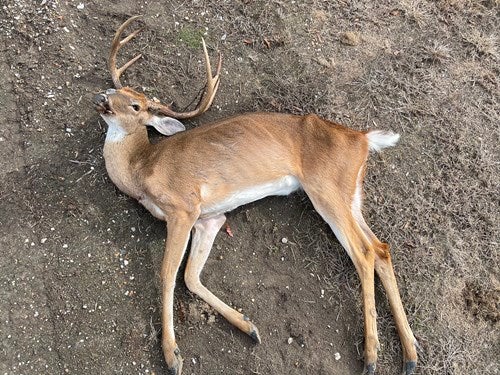Chronic Wasting Disease Update: Warren County buck confirmed positive case of CWD
Published 1:06 pm Monday, January 31, 2022

- This is a photo of a mature buck who was confirmed to be positive of CWD according to the Mississippi Department of Wildlife, Fisheries and Parks. A second case of CWD was detected in Warren County in January. (MDWFP Courtesy Photo)
|
Getting your Trinity Audio player ready...
|
JACKSON — Mississippi Department of Wildlife, Fisheries and Parks Deer Program Coordinator William McKinley said the Wisconsin Veterinary Diagnostic Lab confirmed a Warren County buck had Chronic Wasting Disease. This buck was 4.5 miles south of the first positive case of CWD in Mississippi.
The second deer in Warren County is a suspect positive for CWD. McKinley said they are still waiting on its confirmation as a positive. In total, Mississippi had 11 suspect positives confirmed. Ten of these are from the northern region of the state. He said this season, all of the suspect positives the Wisconsin lab-tested were confirmed positive.
MDWFP’s diagnostic lab is up and running again. Lab technicians there have worked hard to make up for lost time due to an equipment malfunction last week. The machine was repaired Thursday and since then they have run diagnostics on about 1,000 samples.
Mississippi hunters have submitted 5,226 samples for CWD testing this season. MDWFP’s goal is to have 10,000 at the end of the year.
“In the past, the last weekend of the season has had a respectable amount of samples,” McKinley said. “It was good hunting weather this weekend. We expect to have some more samples come in. We will have more come in from taxidermists in the next few weeks as well.”
As of January 31, 2022, hunters in Adams County submitted 30 samples this season, Franklin County has 41 samples, Wilkinson County has 46 samples, Jefferson County has 63 samples and Claiborne County has 80 samples. Collecting samples is the only way the MDWFP can detect CWD and manage the disease. There is no known cure for the disease.
CWD testing continues after season
Typically, the MDWFP picks up samples from freezer locations on Mondays. With Monday being the final day of the 2021-2022 deer season, except in Southeast Mississippi, they will pick up samples on Wednesday to give hunters some extra time to drop off samples.
He expects a good turnout for the last weekend of the season. In his weekend travels, McKinley said he saw a lot of hunters afield, which is a good indicator for sample turnout.
MDWFP continues to collect samples once deer season ends, but they do not pick up CWD samples weekly. Anyone who wants to get a deer sampled outside of the deer season needs to contact the Mississippi Department of Wildlife, Fisheries and Parks.
McKinely said anyone who hits a deer with a vehicle outside of deer season and wishes to possess the deer needs to call a conservation officer. If a person wants the deer tested for Chronic Wasting Disease, they can ask a conservation officer to call an MDWFP biologist.
What is CWD?
Chronic Wasting Disease is a disease in White-Tailed Deer, Elk, and Mule Deer. CWD is caused by a contagious prion. For some deer, it could take a year or more to develop symptoms. Those symptoms are drastic weight loss (wasting), stumbling, listlessness, and other neurologic symptoms. Infected animals shed prions through saliva, feces, blood, and urine.
Other deer can become infected through direct contact with an infected animal and indirect contact from an infected environment. Once the disease occurs in an area, evidence demonstrates eradication is unlikely.
Submitting CWD samples
Each time a hunter submits a sample for CWD testing they enter their name in a CWD raffle for a chance to win $1,000, and two people will win $500. Winners will be drawn at random after February 15, 2022.
Hunters can drop CWD samples off at testing locations in the Miss-Lou. Hunters in Jefferson and Adams County can submit samples at Natchez State Park located at 230-B Wickliff Road, in Franklin County samples can be dropped off at the US Forest Service office at 3085 US98 in Meadville. Wilkinson County hunters can drop CWD samples off at the Wilkinson County Sheriff’s Office at 1389 US61 in Woodville. Hunters can also submit samples through participating taxidermists.
CWD has not been detected in Claiborne, Jefferson, Franklin, Adams or Wilkinson Counties.






